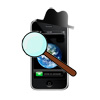 A Swiss iPhone developer has released a new application that is capable of harvesting huge amounts of personal data from iPhones, including geolocation data, passwords, address book entries and email account information, all using just the public API.
A Swiss iPhone developer has released a new application that is capable of harvesting huge amounts of personal data from iPhones, including geolocation data, passwords, address book entries and email account information, all using just the public API.
The application, called SpyPhone, uses the public iPhone API that Apple made available for application developers, and does not need any exploits or hardware attacks in order to access the iPhone’s data. Instead, SpyPhone relies on using the iPhone’s usability and depth of features to its advantage. Once an application is on an iPhone, it has unfettered access to much of the data and settings on the device, a circumstance that SpyPhone’s developer, Nicolas Seriot, exploited.
Seriot has posted the source code for SpyPhone online and gave a talk about SpyPhone’s capabilities at a security conference this week.
Once on the iPhone, the application begins looking at the stored data that’s available in various other programs, such as the email address book and the keyboard cache, which keeps a record of every keystroke the user enters in a non-password field, Seriot said. This data normally is used for the iPhone’s autocomplete feature, but can be a gold mine of information for an attacker searching for intelligence on the iPhone’s owner.
 By default, the iPhone will tag any photos taken with the device with the date and location of the pitcure. The user can turn this feature off, but if it’s enabled, SpyPhone can access that data, as well as the log of which WiFi hotspots the device has connected to. All of this gives the attacker a better picture of the iPhone’s owner, his location and his interests, which is valuable data.
By default, the iPhone will tag any photos taken with the device with the date and location of the pitcure. The user can turn this feature off, but if it’s enabled, SpyPhone can access that data, as well as the log of which WiFi hotspots the device has connected to. All of this gives the attacker a better picture of the iPhone’s owner, his location and his interests, which is valuable data.
All of SpyPhone’s operations are conducted in the background, without the knowledge of the iPhone’s user, and the application can be set to email reports on each infected phone back to the attacker.
Apple has taken pains to keep strict control over what applications can run on the iPhone, but malicious apps have been found in the company’s AppStore in the past. And while Apple has to approve all of the programs in the AppStore, users who have jailbroken iPhones can run any app they choose on their devices. That leaves plenty of opportunity for seemingly innocuous apps that contain malicious components.









